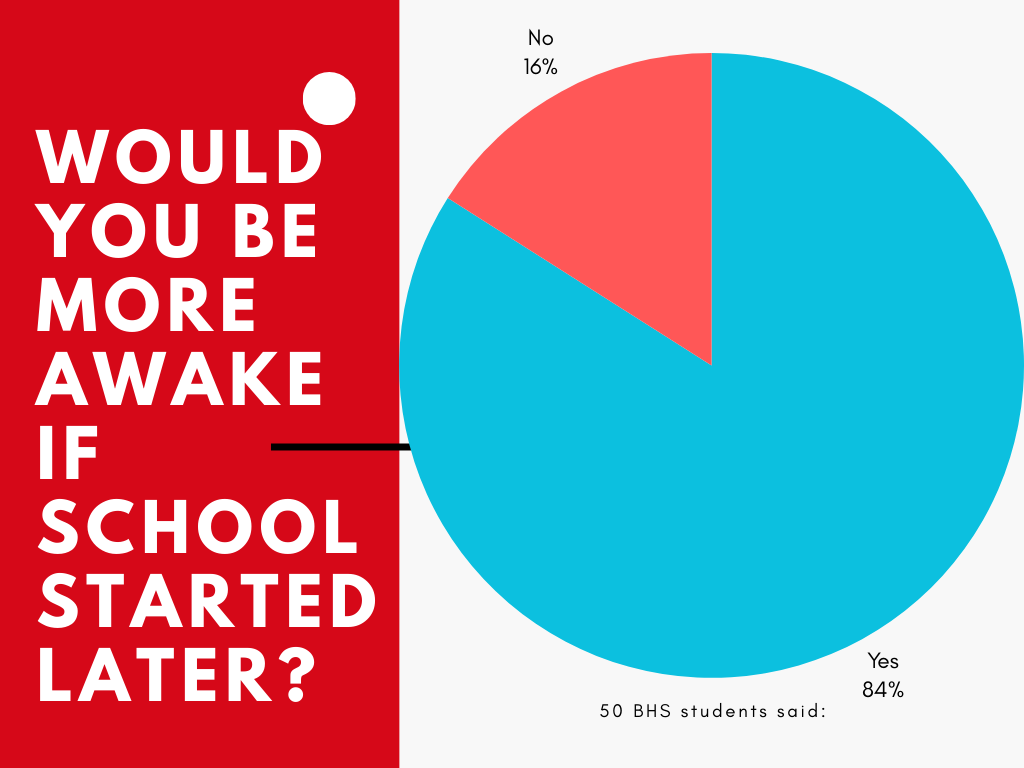
Why BHS should start school later
By Lylah Jakubiak
This school year, BHS has accumulated almost a week’s worth of E-learning and snow days. As a result, many students ended up sleeping in during this time. Now back in school, some students are beginning to question the 7:35 start time, wishing for their morning sleep back.
Throughout their lives, students have been told they must be awake, sitting in school, and ready to learn at the crack of dawn. This rhetoric conveniently left out a whole host of evidence, studies, and expert testimonies that strongly advise the contrary. For the good of the students, BHS should start later.
With the current system, it’s unlikely BHS teens can get enough sleep to fuel them for their day. Let’s say a student gets up an hour and a half early before school to commute and prepare for the day. At BHS, they’d have to wake up at about 6. The CDC states that teens should sleep for about nine hours each night. The student would have to go to bed at approximately 9 PM to be well rested and on time for school. Sadly, this perfect scenario isn’t the case for most students. If you were to ask BHS students what time they went to bed, most wouldn’t say 9. Instead, you’d hear 10, 11, 12, or even later. Additionally, the CDC issued a survey in 2018 that found that only 25.7 percent of students nationwide got 9 hours of sleep on school nights.
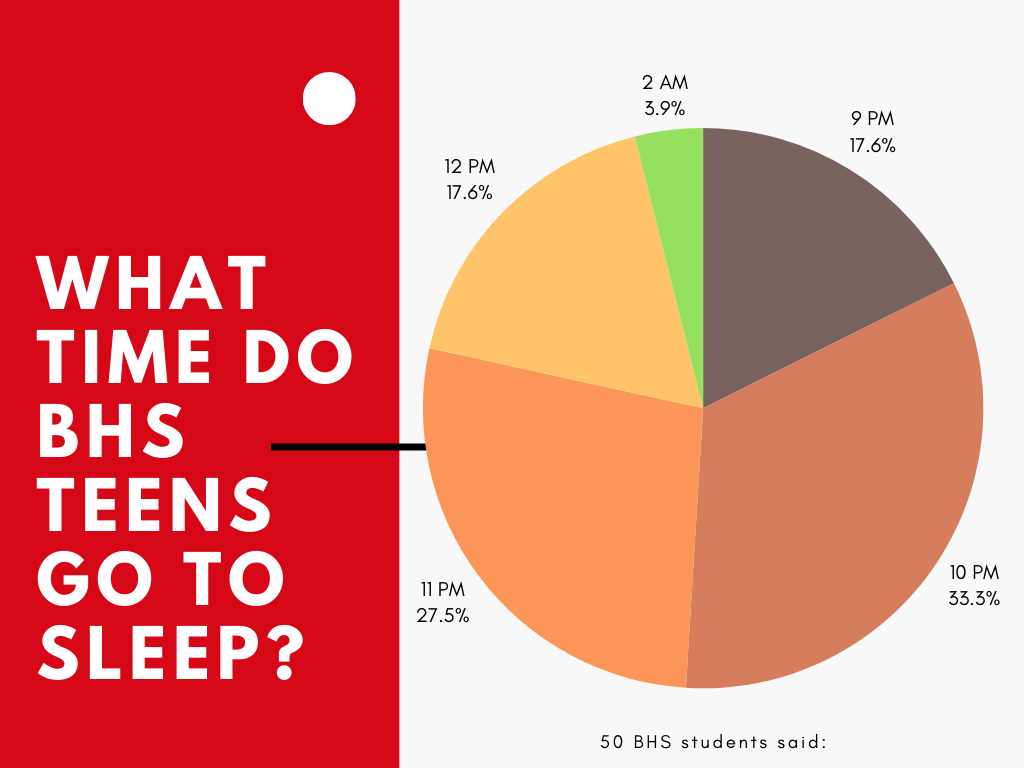
Out of a poll of 50 BHS students, 82.4% go to bed later than 9 PM
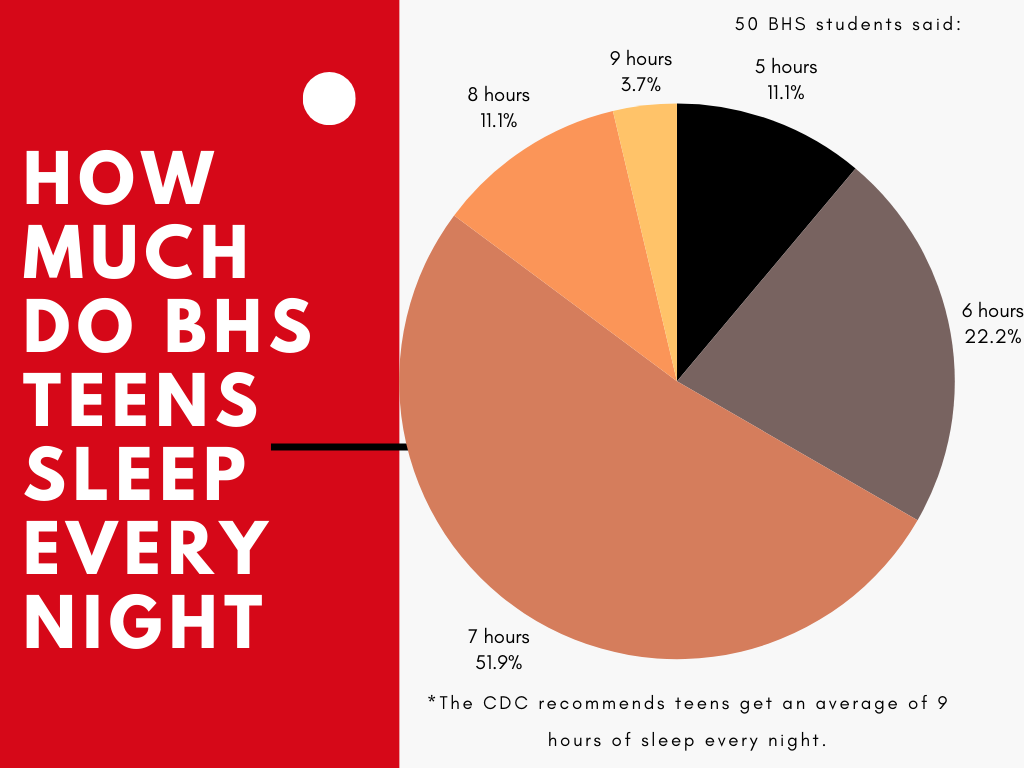
Only 3.7% reported getting 9 hours of sleep
One in four students isn’t a very positive number, especially considering the implications of lacking sleep on people who are expected to be alert and focused all day long. If you’ve ever been tired, you’ve certainly felt how your focus isn’t as sharp as usual, or your alertness wavers, especially in the early morning when you’re not completely awake yet. This can be applied to students, too, when it’s early in the morning and they’re sitting in class without an adequate amount of sleep.
“In the morning, students absolutely tend to be tired and unfocused,” said Dana Sacramento, a BHS teacher of 18 years. “It takes them a little time to wake up and get motivated.”
This lack of concentration can cause grades to suffer, too. A study on college students found that students who slept about nine hours or more each night averaged a GPA of 3.24 while those under 9 hours averaged 2.74. While this is just an average and there’s no guarantee that this will translate into BHS grades, these numbers are still concerning considering that three-quarters of students aren’t getting those nine hours.
Coming to school on time every day is critical to academic well-being and success, which is why it’s worrying when sleep is also tied in. Start School Later, a nonprofit organization told the story of how schools in Saco, Maine, switched to starting school later in 2016. Soon after, the school reported seeing a 40 percent drop in tardies and a 50 percent reduction in visits to the nurse which resulted in more time spent in class learning. Staff also reported that students appeared “more alert and ready to learn.”
Late start can help offer insight into what this would look like for BHS because it models the same principals found in Saco schools.
“I would say that fewer students are tardy during late start, and they seem a bit more energized. That smidge of extra time does make a difference,” Sacramento said.
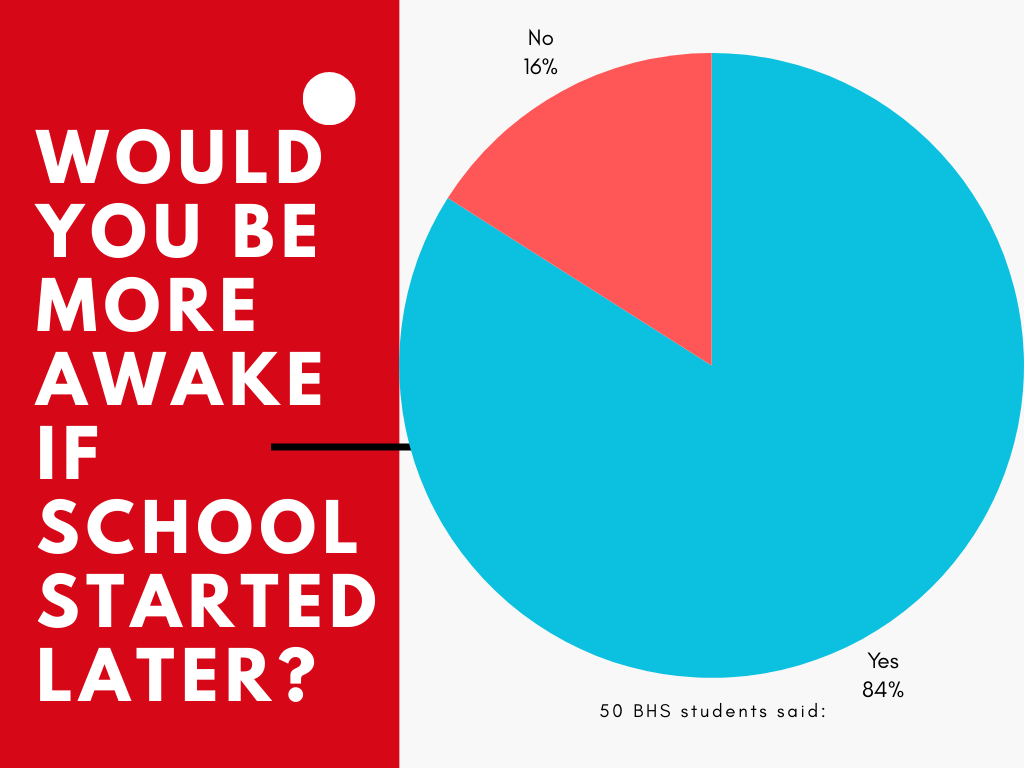
84% of students believe they’d be more awake if school started later
There are various criticisms of later start times, one of the main ones being that school would have to end later, which can cut into teens’ busy afternoons.
Alton Rollerson, the Freshman counselor, brought this up in an interview last Wednesday.
“There’s only so much time in a day. It’s kind of like our schedule,” Rollerson said. “You guys are just so busy with outside stuff.”
He’s right. Students are busy these days, and getting out of school later won’t help, but think about how increased focus could improve the productivity of teens throughout the day and make up for lost time.
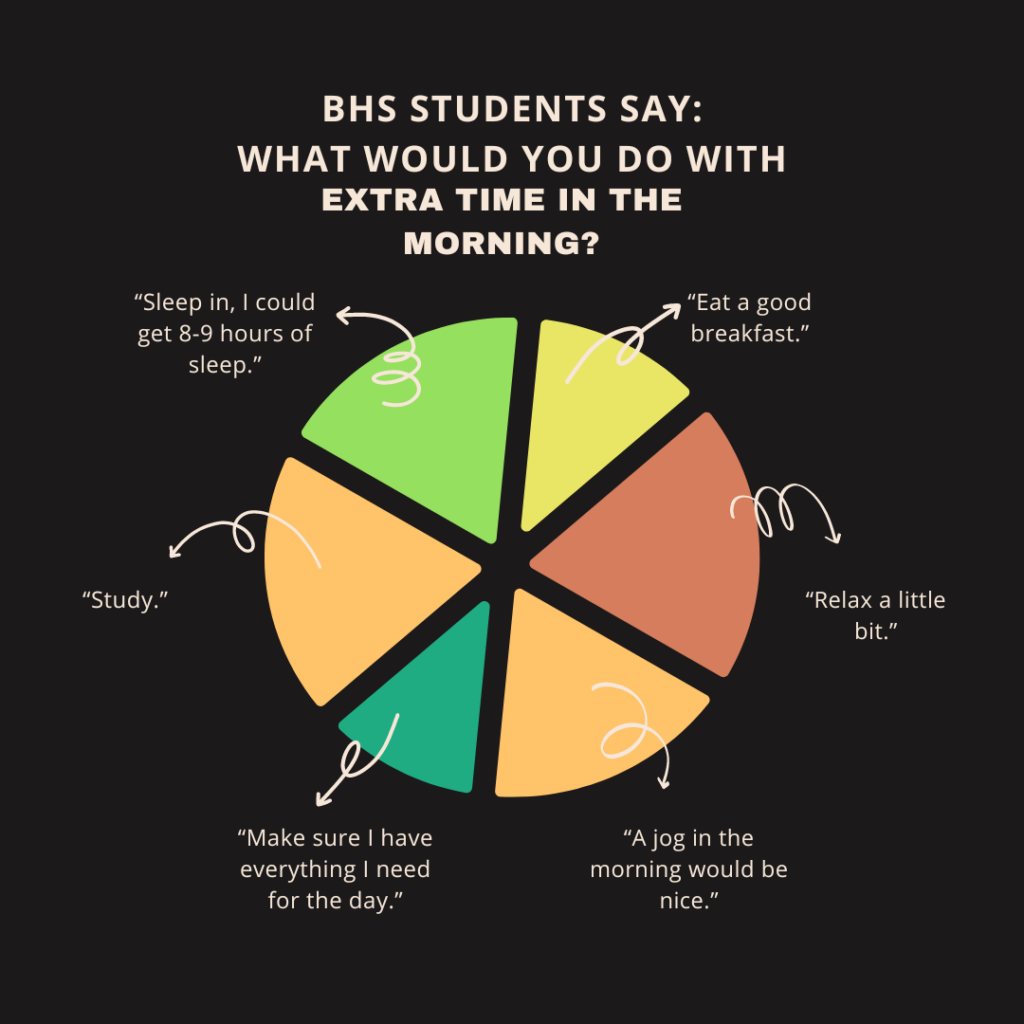
Another common argument is that teens could have stricter night-time routines and go to bed earlier. Unfortunately, this won’t work for many teens due to the body’s circadian rhythms. Circadian rhythms are the term for your internal clocks which help you wake up, go to sleep, and be alert throughout the day. During adolescence, teens’ circadian rhythms shift forward about two hours. Due to this, when a teen wakes up at 6 AM for school, it would feel to an adult like waking up at 4 AM.
Furthermore, the shift of teen’s internal clocks delays the natural release of melatonin in the brain. Melatonin is a natural hormone responsible for triggering drowsiness and facilitating sleep. For teens, melatonin isn’t released until about 11 PM, making it difficult to fall asleep before then. So, if a teen went to bed at their body’s ‘natural’ time, 11 PM, they’d only sleep for 7 hours before waking up for school.
According to behavioral scientist Wendy Troxel, the ideal sleep schedule for a teen is 11 PM to 8 AM, accomplishing that 9 hours of sleep and adhering to their internal clocks. With a two-hour difference from Troxel’s suggestion, BHS’s start time forces teens into an unnatural sleeping pattern that disturbs their body’s natural cycles.
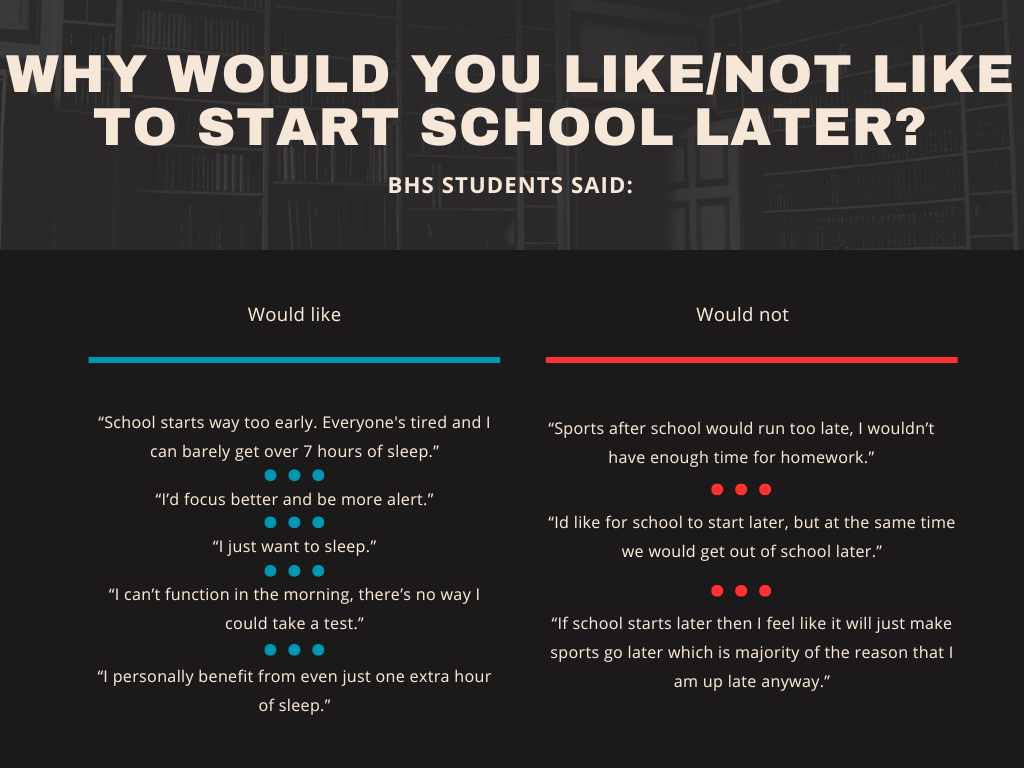
Pros and cons of a later start time, BHS students said:
Interestingly, students and teachers seem to agree that starting school later is a worthwhile approach to the tiredness of BHS students.
“I would love to see it happen. It would be better for the kids to wake up later. We could start at 10 or something like that. They’ve been talking about it for years,” Rollerson said.
He’s not the only one who showed support for it, either.
“I would like it if school started later,” said Gen O’Shea, a BHS freshman. “I think it could make me more productive.”
Even Sacramento, who was more hesitant in her support said, “I’d be willing to try it out. It would be cool to do observations one semester and try it, but only if it positively benefited the students.”
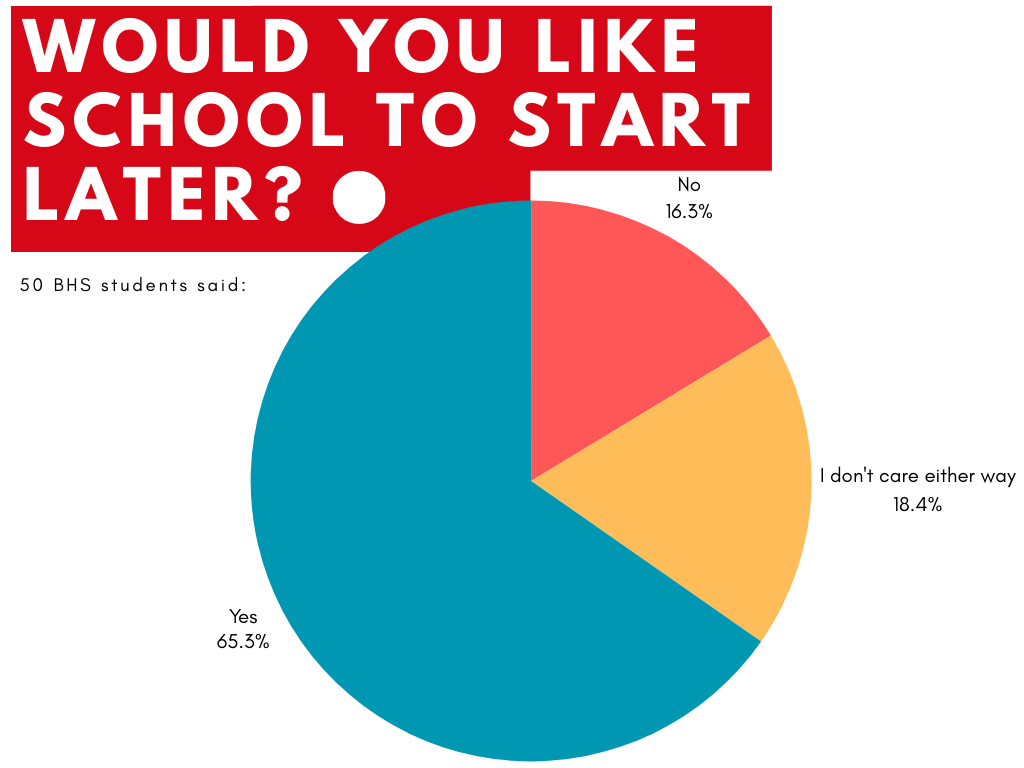
65.5% of students would like to see a later start time at BHS
If BHS were to make this change, if only for a semester as Sacramento suggested, it would benefit the students in so many ways: Students could finally fall back into sync with their natural rhythms, get plenty of sleep, be present in class more often, and have better focus and attention. All our academic career, we’ve been told to be awake, aware, productive, and focused all while we’re running on an unhealthy amount of sleep. This has been an issue for students for a long time, and it’s finally time to bring attention to and stop this ongoing problem.